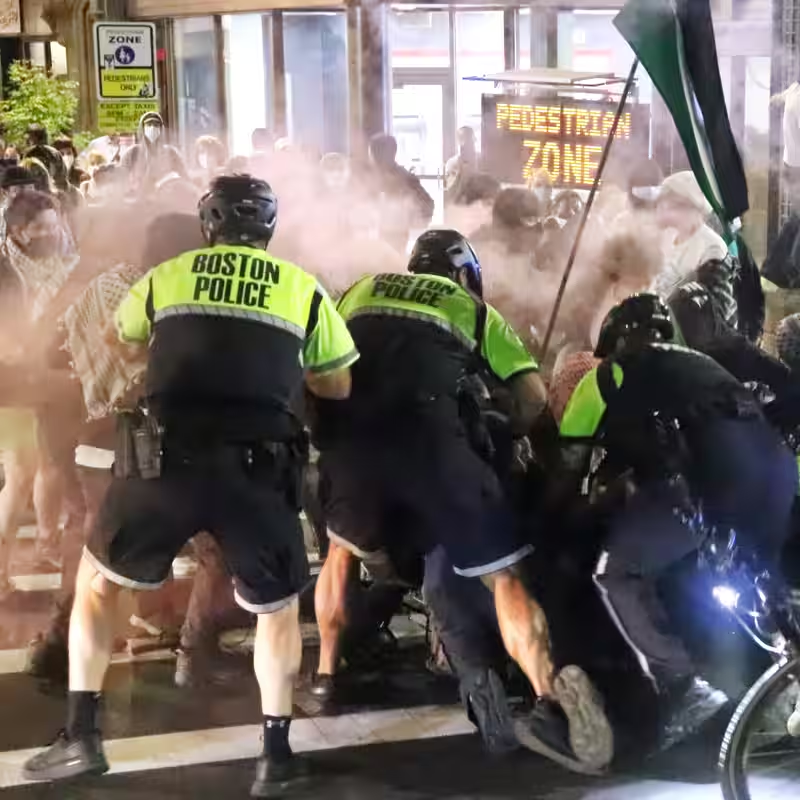Table of Contents
- What Happened in Boston?
- The Obscure ‘Promotion of Anarchy’ Law—Explained
- Is This a Message to Trump?
- What the Defense Says
- A Growing National Trend?
- Sources
Boston Protesters Face Felony Charges After Clash with Police
Thirteen young protesters in Boston are now facing serious felony charges—including one rarely used law dating back to the Red Scare era—after a pro-Palestinian demonstration near Boston Common turned violent on October 7, 2025.
The protest, held on the second anniversary of the 2023 Hamas attacks on Israel, drew more than 200 people. According to Boston police, demonstrators refused to clear a major roadway, leading to a confrontation that left four officers injured. In response, prosecutors charged all 13 arrested individuals with “inciting a riot”—a statute also known as “promotion of anarchy.”
If convicted, they could face up to three years in prison.
The Obscure ‘Promotion of Anarchy’ Law—Explained
Massachusetts’ “promotion of anarchy” law was originally crafted in the early 20th century amid fears of anarchist bombings and labor uprisings. Though rarely invoked today, it criminalizes speech or actions that “incite, promote, or encourage violence or disorder with intent to overthrow civil authority.”
However, the Massachusetts Supreme Judicial Court narrowed its application in a 2021 ruling, stating it can only be used in cases involving a “true threat” or “imminent incitement”—not merely provocative or unpopular speech.
According to prosecutors, Tuesday’s protest crossed that line. They cited online flyers that allegedly promoted “violence against police” and called for “disruptive direct action.” Bail for several defendants was set at $10,000.
Is This a Message to Trump?
While city officials didn’t mention President Trump by name, the timing is hard to ignore.
Just days earlier, Trump deployed National Guard troops to cities like Portland and Los Angeles, accusing Democratic mayors of allowing “lawlessness.” Boston—led by progressive Mayor Michelle Wu and Governor Maura Healey—now appears to be drawing a line: We’ll police our own streets, thank you.
“If you assault police and commit other offenses, you’re going to be arrested and prosecuted, period,” said Suffolk County District Attorney Kevin Hayden.
Mayor Wu added: “Attacks on police officers are unacceptable under all circumstances.” Governor Healey echoed the sentiment, declaring, “There is no tolerance for blocking roadways or assaulting police.”
Legal analysts say the move may be as much about political signaling as public safety.
What the Defense Says
Attorneys for the accused strongly dispute the narrative. Kylah Clay of the National Lawyers Guild called the charges “government overreach” and accused police of “brutalizing antiwar marchers.”
“They knocked cameras from the hands of young people recording their brutality and left protesters with injuries requiring medical care,” Clay said in a statement.
The ACLU of Massachusetts also raised alarms. Legal director Jessie Rossman warned that the “promotion of anarchy” charge risks chilling protected speech. “The First Amendment only allows the government to criminalize speech in very limited circumstances,” she said. “Any attempt to apply this law beyond that scope is unconstitutional.”
A Growing National Trend?
Boston isn’t alone. Across the U.S., prosecutors are increasingly turning to felony charges to address protest-related unrest:
| Location | Year | Charges | Context |
|---|---|---|---|
| Santa Clara, CA | 2024 | Felony trespass, vandalism | Pro-Palestinian campus protest |
| University of Pittsburgh | 2024 | Felony rioting | Encampment blockade |
| Chicago, IL | 2024 | Mob action (felony) | Downtown march |
| Boston, MA | 2025 | Promotion of anarchy | Pro-Palestinian rally |
Critics argue this trend criminalizes dissent. Supporters say it restores order. Either way, the use of century-old laws against modern protesters is reigniting debates about free speech, public safety, and the balance of power in a polarized America.




